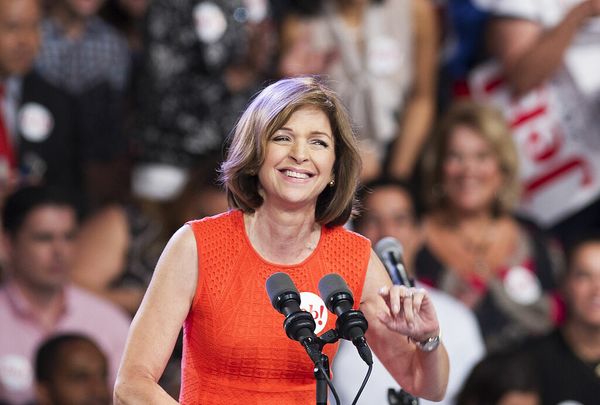MIAMI — More than 100 people who live in the twin Haley Sofge Towers — a public housing complex near the Miami River with about 475 units — changed their political party affiliations during a recent three-month period, adding to questions about whether some residents’ party affiliation was changed without their consent.
Every single one of those voters, 103 of them, switched to the Republican Party, according to a Miami Herald analysis of Miami-Dade voter registration data.
The Haley Sofge Towers has become the focus of county investigators and media in recent weeks, as longtime voters say their political affiliation was changed without their consent after interacting with canvassers. The story of a Little Havana voter whose story drew attention to the claims, 84-year-old Maria Jaramillo, was first reported by WPLG Local 10 News last December. Since then, several other voters have spoken publicly about receiving new voter ID cards in the mail with a different party affiliation.
According to the Herald’s tally, 5,428 people’s party affiliation changed between the October and January registration files. The changes were concentrated in multi-family residential buildings, often low-income housing, raising questions about whether the changes are part of a targeted effort.
“Party switching is increasingly rare given the hyper-polarization in this country,” said Daniel Smith, chair of the Political Science department and professor at the University of Florida. “Concentrations of changes in registration from one political party to the other is highly suspect and could be indicative of fraud by party operatives.”
After calls from lawmakers to look further into the allegations, Miami-Dade State Attorney Katherine Fernández-Rundle said her office would investigate the claims.
The Herald’s analysis shows that more than half of all changes since October resulted in party affiliations switching to Republican while just under 13% switched to Democrat. Meanwhile, in clustered areas where five or more people changed parties in a given address, 90% switched to Republican, the data show. And in those same clusters, the average age of those who changed their party affiliation was 75, while the average age of voters in all of Miami-Dade who switched is 54.
For comparison, during the same months of 2017 and 2018 — in the months leading up to a midterm election — the number of people who switched parties was almost 50% lower, and the breakdown of where these individuals lived was less concentrated than it has been in the past cycle. The highest number of people who lived in one address and switched their party affiliation was four.
Florida Sen. Annette Taddeo, a Democrat who is running for governor, has been fielding calls from voters who have come forward alleging their voter registration was changed since last December. Taddeo says she’s heard from about 12 voters who have reached her office. All are either lifelong Democrats or were not affiliated with any party before they got a new voter ID card in the mail identifying them as Republicans.
On Friday, Taddeo announced she requested an emergency investigation by the Florida Senate Ethics and Elections Committee, of which she is the vice chair. The request is for the committee to use its subpoena power to investigate whether a group or organization illegally changed voters’ affiliation.
Taddeo has said the claims are just a piece of a larger puzzle, saying there’s “clearly a statewide effort that has affected the narrative in the media” about Florida Republicans’ voter registration advantage over Democrats. She has also alleged there are more sinister intentions at play, pointing to Democratic campaign donors who’ve refused to invest in key races across the state.
“They (Republicans) wanted this so that those donors and those investors in Democratic campaigns walk away from Florida, which is exactly what they did,” said Taddeo.
The allegations from Taddeo, however, come at a time when Republicans have celebrated a historic advantage over Democrats in voter registration. As of Jan. 31, the GOP has a lead of 67,475 active voters over Democrats in the state. It also follows a general election in which Republicans saw overwhelming support from Latino voters in Miami-Dade, lifting Republican candidates across state and federal races and leading Republicans to argue that party-switching is a result of their legitimate gains.
Taddeo alleged Friday that these changes in party affiliation would hurt primary candidates like herself, whose supporters wouldn’t be able to vote for her. (Florida has a closed primary system, which means that only voters affiliated with a party would be able to vote in that party’s primary.)
“My name will not be there,” she said of the effect it might have on Democratic voters who want to vote for her in the gubernatorial primary. Taddeo is running against U.S. Rep. Charlie Crist and Agriculture Commissioner Nikki Fried for the Democratic nomination to challenge Gov. Ron DeSantis.
It would have prevented, for example, Taddeo supporter William Arcilla from voting for her in the Aug. 23 primary. A Democratic voter who lives near Country Walk, Arcilla heard the news of voters’ party affiliations being changed and remembered he and his wife had received new voting cards in the mail in November. He checked them and realized both he and his wife, who have been Democrats since 1996 and 2004 respectively, were now registered Republicans. (The Herald viewed the Arcillas’ before-and-after voter cards and confirmed their new affiliation was listed as the Republican Party.)
“What worries me is that no one came here. I didn’t speak to anyone, and I didn’t request anything,” Arcilla told the Herald. “I’m Colombian, and I want to support Annette, for example. But in a primary, I wouldn’t be able to do that.”
Broward County Supervisor of Elections Joe Scott told the Herald on Wednesday that his office has not received any complaints of party affiliations being changed and hoped the Miami-Dade cases were isolated. But he said Arcilla’s case, for example, was a concerning anecdote.
“What I hope is the case is that they may have forgotten because that’s probably the best-case scenario. The worst-case scenario is that someone forged a voter registration application,” Scott said.
Jaramillo, the first voter who contacted Taddeo’s office, took a photo of the canvasser who was at her door, along with a badge with the logo of the Republican Party of Florida (RPOF). Jaramillo, who is Colombian, was shown a registration form that was all in English, even though she doesn’t speak the language. She said the canvasser filled it out for her.
RPOF has previously denied allegations that it has done anything against Florida law. In a statement Friday, Executive Director Helen Aguirre Ferre said the party is taking additional measures to “avoid any possible confusion amongst voters choosing to change their party affiliation,” including a disclaimer form in English and Spanish where voters can acknowledge they are aware they are changing their party affiliation.
Aguirre Ferre also shot back at Taddeo’s allegations, saying that Democrats “don’t understand the problem they have on their hands.”
“Annette Taddeo is trying to blame others for her inability to tap into donor dollars, but she has only herself to blame — Taddeo isn’t a compelling candidate. If Taddeo does not inspire confidence in the Democrat donor base then that is on her, I hardly think those donors would take any advice from the RPOF,” Aguirre Ferre said in an email.
During the news conference in front of Haley Sofge Towers, Taddeo said she spoke with a woman in Hillsborough County who said she worked for a third-party organization that was giving workers quotas for how many Republicans they should register, and incentivizing them to switch voters’ party affiliations by offering them cash bonuses. She said the woman, who she said worked with Florida First, would be cooperating with authorities in Hillsborough. Taddeo did not name any other canvassers who have contacted her office.
Florida First, Inc. is listed in the state’s third-party voter registration organization database as being based in Pinellas Park, which is in Pinellas County. However, it is listed as doing registration activities in all counties in the state.
Shannon O’Leary, who identified herself as a lawyer for Florida First, said the group “shuttered in 2020” shortly after the coronavirus pandemic took hold in Florida. The group is listed as “active” in the state’s database, but O’Leary said that the group has “absolutely no staff in Florida at all” and the state director has moved out of Florida.
“Certainly there shouldn’t be anybody walking around saying they’re working for Florida First,” O’Leary said. But even while the group was running, workers were paid hourly and “nobody was offered incentives to try and switch people’s registration.”
Asked whether Florida First worked for the RPOF, O’Leary said: “There wasn’t any cross-consulting … I’m sure it was a convenient, provocative statement.”
Florida First faced similar questions in March 2020 when a woman working for the group was arrested and charged with 10 felony counts of submitting false voter registration information. According to Lake County Supervisor of Elections Alan Hays, the woman had submitted more than 120 voter registration forms with forged signatures, bogus personal information and unauthorized party registration switches from Democratic or independent to Republican.
Aguirre-Ferre said the RPOF is not familiar with Florida First.
Hillsborough District Attorney Andrew Warren said through a spokesperson that he has spoken with Taddeo and that she briefed him on the issues she discussed in the news conference.
“She is planning to send documents to our office in the coming days,” said Grayson Kamm, Warren’s spokesperson. “Once we receive those, we will review them and take appropriate action.”
“We take any allegation about voter registration deception or fraud very seriously. The law in Florida is clear that anyone engaging in third-party voting registration activities has a fiduciary duty to the person they are registering. The law also makes clear that the Secretary of State may refer these matters to the Attorney General for enforcement.”
Asked by reporters about the party affiliation claims, DeSantis — who has pushed Republicans in the Legislature to pass several election bills — said during a visit to Miami on Monday that any violations of election law must be taken seriously.
“It doesn’t matter which group is doing it, if they’re changing to Republican and that’s illicit, they need to be held accountable. If they’re doing the opposite, they need to be held accountable,” DeSantis said, touting Republicans’ crackdown on ballot harvesting and the Legislature’s efforts to create a law enforcement body that would investigate election fraud claims.
(Miami Herald investigative reporter Sarah Blaskey and Tampa Bay Times political editor Emily L. Mahoney contributed to this report.)










